Vegan Protein Powder Market Research, 2031
The global vegan protein powder industry was valued at $3.5 billion in 2021, and is projected to reach $7.3 billion by 2031, growing at a CAGR of 7.8% from 2022 to 2031.
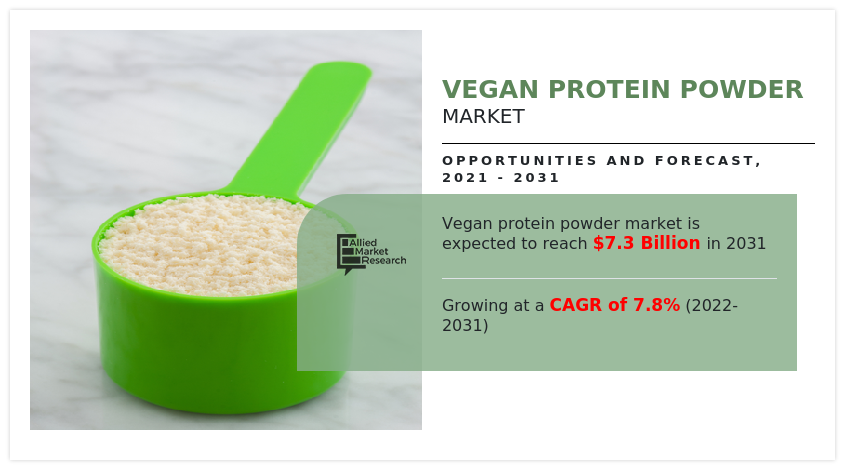
The vegan protein powder market share is segmented into Nature, Product Type, Age Group, Packaging Type and Distribution Channel.
The vegan protein powder that is processed and derived from different types of nutritional plant sources is known as plant-based protein supplement product. Soy, pea, chickpea, brown rice, spirulina, hemp, and others are some of the key plant-based sources used as prime ingredients for the processing of vegan protein powder.
A significant rise in the vegan population across the globe is a major factor behind the surging vegan protein powder market demand. Moreover, the rise in the prevalence of zoonotic diseases among humans and rising awareness about this is a major factor that is fueling the adoption of vegan protein among consumers. It is estimated that around 1% of the global population is vegan and this number is expected to rise significantly in the forthcoming years. Furthermore, rising consumer awareness regarding the benefits of vegan protein over animal protein is boosting the growth of the vegan protein powder market.
According to the Vegan Society, in 2021, there were 79 million vegans around the globe. The rise in awareness about the health benefits associated with the consumption of vegan food products has led the majority of the population to adopt a vegan diet. This has led to burgeon demand for different types of vegan food products from its health-conscious target customers. This similar kind of trend has been enduring even in the sports segments. Professional sports personnel and athletes are now adopting into vegan diet owing to an increase in awareness about the associated benefits. This consumer perception altogether has triggered demand for vegan protein supplement products.
Lactose intolerance is characterized by a reduced capacity to digest lactose, a sugar present in milk and other dairy products. According to National Center for Biotechnology Information (NCBI), lactose intolerance affects around 65% of the adult human population. Lactose intolerance causes bloating, nausea, vomiting, and diarrhea, prompting many to seek lactose-free dairy alternatives on the market. The increased concern about lactose intolerance in adults is driving the market demand for vegan protein powder products.
The competition in the vegan protein powder market is intense, therefore, market players are focusing on strong branding and improved advertisements to attract consumers’ interest. Branding and advertisements play a vital role to gain consumer cognizance regarding the products. As a result, players are venturing into lucrative marketing campaigns to attract consumers. For instance, in January 2020, Premier Protein, a supplement company, announced the launch of a creative advertisement campaign with the tagline "Too Good to be Good" to be advertised on television, YouTube, and other social media sites.
The campaign was created to attract consumers and present a perspective that vegan proteins are unique. Thus, the use of social media, strong branding and advertisement tactics help in increasing the popularity and the sale of products, which, in turn, notably contribute to the growth of the global vegan protein powder market.
Advancements in science and technology have helped to bring out solutions to different problems. In recent times, the global population is concerned about maintaining proper health conditions; therefore, the need for weight management and calorie management in individuals has increased. Vegan protein products are a suitable substitute for a complete meal for an individual, and these products assist in managing calorie portions and fulfill the protein requirement. However, vegan protein products incur a high manufacturing cost due to the involvement of additional manufacturing processes, usage of advanced technology, and high-class raw materials to improve the nutritional value of the product. High manufacturing costs further force manufacturers to reflect a higher sales price of vegan protein powder. Consumers in developed economies have moved to protein products to improve their overall health due to the rise in health concerns and changing lifestyles. On the contrary, in developing economies, consumers are price-sensitive; hence, the chance of opting for high-priced vegan protein products is low. Thus, the decline in sales of vegan protein powders in developing and weaker economic countries hinders the growth of the vegan protein powder market.
According to the U.S. Census Bureau, millennials are on the verge of surpassing baby boomers in the country. Similarly, in Asia-Pacific, millennials account for a larger population, especially in countries such as China, India, and Australia as compared to other population groups. Millennials, the population aged between 20 and 35 years, are active, and broad-minded. They have been influential in evolving various global industries in terms of product offerings and services. They always tend to try products that are new in the market and determine whether the products cater to the requirements. Moreover, the majority of the millennial population are health conscious and tend to buy product that benefits their health. This factor is projected to fuel the growth of the market.
The vegan protein powder market is segmented into nature, product type, age group, packaging type, distribution channel, and region. Depending on nature, the market is classified into organic and conventional. Depending on product type, the market is classified into soy, spirulina, pumpkin, pea, rice, hemp, and others. Depending on age group, it is segregated into Millennials, Generation X, and Baby Boomers. By distribution channel, it is categorized into modern trade and e-commerce. Region wise, it is analyzed across North America (the U.S., Canada, and Mexico), Europe (France, Germany, Italy, Spain, the UK, Russia, Benelux, and rest of Europe), Asia-Pacific (China, India, Japan, South Korea, Australia, Malaysia, Indonesia, Thailand and rest of Asia-Pacific), and LAMEA (Brazil, South Africa, Saudi Arabia, UAE, Argentina and rest of LAMEA).
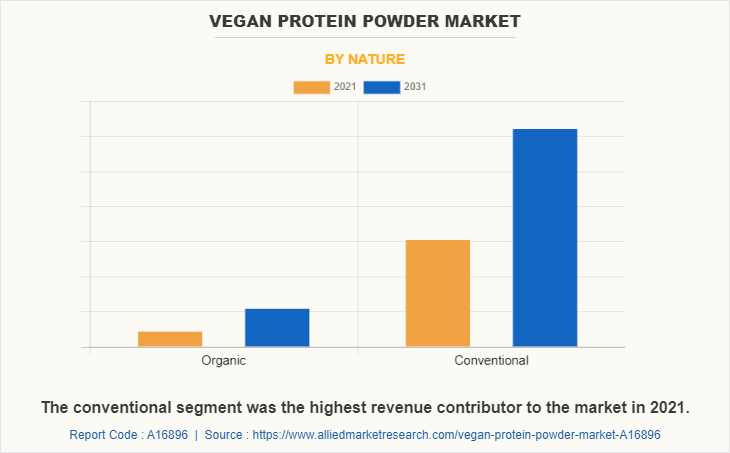
On the basis of nature, the conventional segment gained a major share in the global market in 2021 and is expected to sustain its market share during the forecast period as the availability of conventional vegan protein powder is higher compare to organic vegan protein powder that fuels the sales in the market. The rise in the number of health-conscious customers in most of the developed and key developing regions has been one of the key factors in driving the demand for conventional vegan protein powder products. Manufacturers in the global vegan protein powder market strategize on extending their product offerings in conventional formats that specifically cater to the requirements of their health-conscious customers.
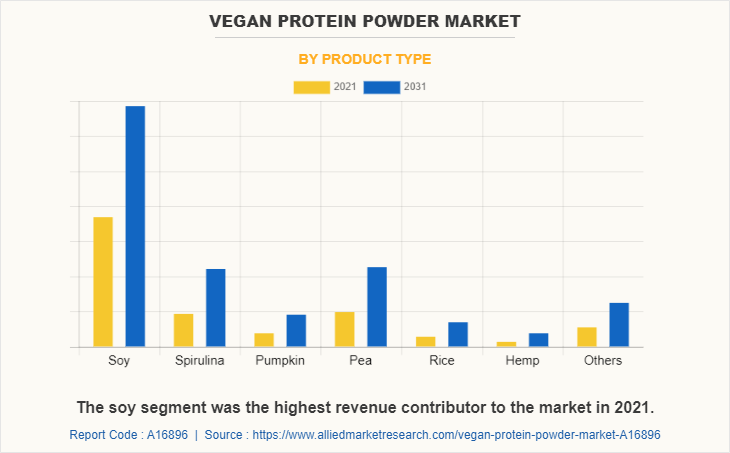
According to vegan protein powder market trends, on the basis of product type, the soy segment gained a major share in the global market in 2021 and is expected to sustain its market share during the forecast period. According to the United Soybean Board, nearly 35% of Americans consume soy foods or beverages once a week or more, which suggests that there has been a gradual rise in demand for soy-oriented products. This is attributed to various health benefits associated with the consumption of soy products.
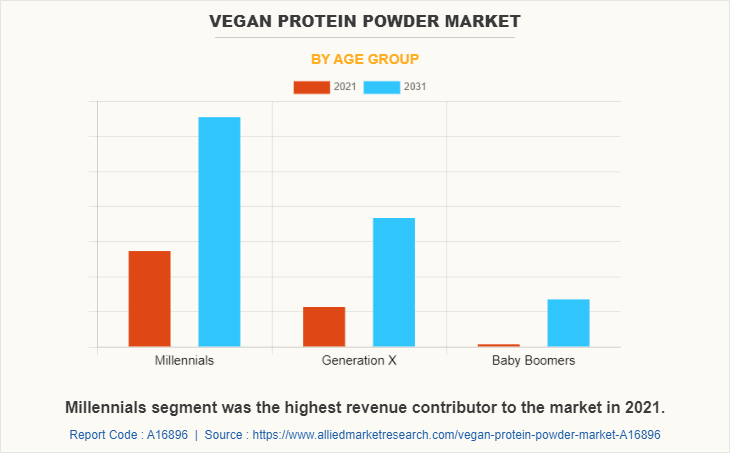
On the basis of age group, the millennials segment gained a major share in the global market in 2021 and is expected to sustain its market share during the forecast period. Plant-based protein or vegan protein is on the rise due to lactose intolerance and change in dietary preferences in Millennials.
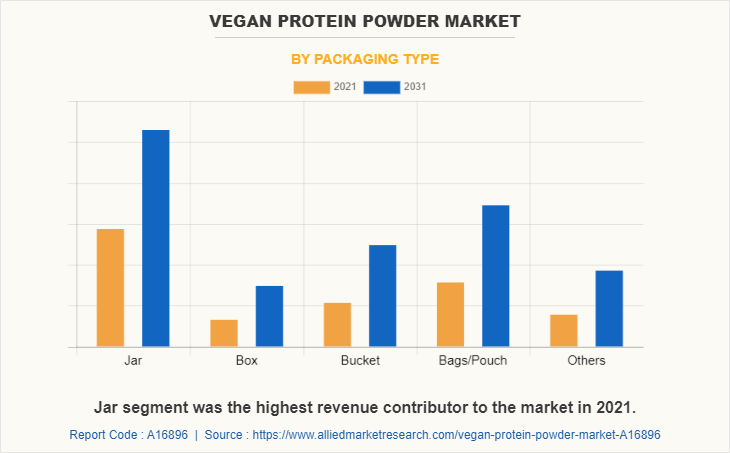
On the basis of packaging, the jar segment gained a major share in the global market in 2021 and is expected to sustain its market share during the forecast period. The oversized jars used to market vegan protein powder products always have featured graphics depicting toned and rippling musculature, highlighting the benefits which will entice the consumers.
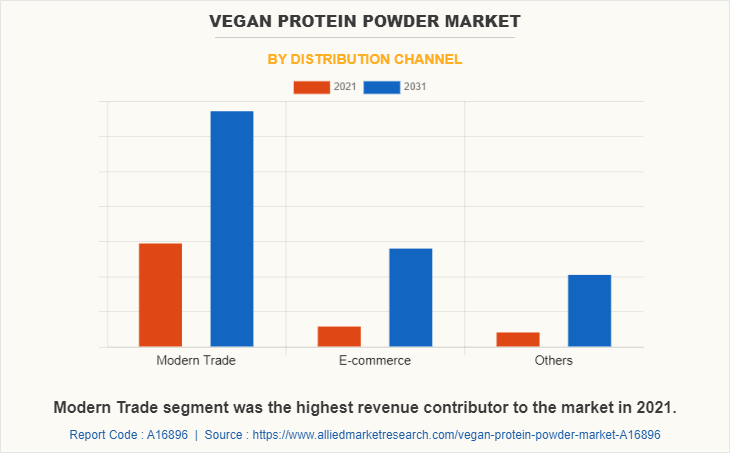
According to the vegan protein powder market analysis, on the basis of distribution channel, the modern trade segment accounted for around 57% of the global vegan protein powder market size in 2021 and is expected to sustain its share during the forecast period. Specialty stores and supermarkets offer a convenient experience of diverse shopping under a single roof to the consumers. Specialty stores provide consumers a premium advantage, i.e., higher availability of tennis shoe products at discounts, the assistance of sales representatives, and easy checkouts. These advantages are expected to drive the vegan protein powder market growth during the forecast period.
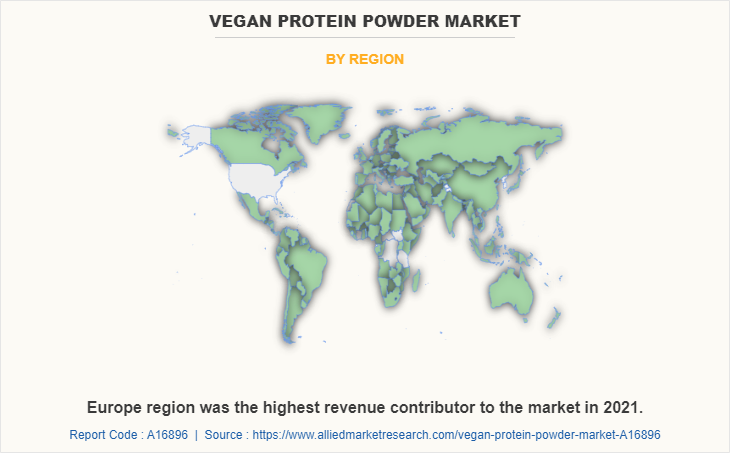
On the basis of region, North America dominated the vegan protein powder market in 2021 and is expected to remain dominant during the vegan protein powder market forecast period. The dominance of the market is largely due to the deep product knowledge among the consumers and the increase in the vegan population in the region. North America is characterized by high disposable income, growing health consciousness, the growing popularity of plant- based products, and others. All these factors boost the demand for vegan protein powder among the population.
The players operating in the global vegan protein powder market have adopted various developmental strategies to expand their vegan protein powder share, increase profitability, and remain competitive in the market. The key players profiled in this report include Archon Vitamin LLC., Sequel Natural Ltd., Hormel Foods Corporation, Vital Amine, Inc., NOW Health Group, Inc., Nutiva Inc., General Nutrition Centers, Inc., True Nutrition, MusclePharm Corporation, Glanbia plc, Abbott Laboratories, GlaxoSmithKline Plc, ABH Pharma Inc., Suppleform, Vitaco Health, Amway Corporation, and Herbalife International of America Inc.
Key Benefits For Stakeholders
- This report provides a quantitative analysis of the market segments, current trends, estimations, and dynamics of the vegan protein powder market analysis from 2021 to 2031 to identify the prevailing vegan protein powder market opportunities.
- The market research is offered along with information related to key drivers, restraints, and opportunities.
- Porter's five forces analysis highlights the potency of buyers and suppliers to enable stakeholders make profit-oriented business decisions and strengthen their supplier-buyer network.
- In-depth analysis of the vegan protein powder market segmentation assists to determine the prevailing market opportunities.
- Major countries in each region are mapped according to their revenue contribution to the global market.
- Market player positioning facilitates benchmarking and provides a clear understanding of the present position of the market players.
- The report includes the analysis of the regional as well as global vegan protein powder market trends, key players, market segments, application areas, and market growth strategies.
Vegan Protein Powder Market Report Highlights
| Aspects | Details |
| Market Size By 2031 | USD 7.3 billion |
| Growth Rate | CAGR of 7.8% |
| Forecast period | 2021 - 2031 |
| Report Pages | 430 |
| By Nature |
|
| By Product Type |
|
| By Age Group |
|
| By Packaging Type |
|
| By Distribution Channel |
|
| By Region |
|
| Key Market Players | Abbott Laboratories, Sequel Natural Ltd., General Nutrition Centers, Inc., Suppleform and Vitaco Health, Nutiva Inc., ABH Pharma Inc., Amway Corporation, Glanbia plc, Vital Amine, Inc., True Nutrition, Glaxosmithkline plc, Hormel Foods Corporation, NOW Health Group, Inc., Archon Vitamin LLC., MusclePharm Corporation |
Analyst Review
According to the insights of CXOs of the leading companies, over the past couple of years, there has been a surge in demand for different types of vegan food products, which is attributable to the rise in awareness about the health benefits associated with the product consumption.
With surge in demand for plant-based protein supplements coupled with the rise in the number of health-conscious consumers, some of the key players in the global vegan protein powder market strategize on expanding their production capacity.
The rise in the rate of internet penetration around the major parts of the world makes way for manufacturers to initiate several key online marketing programs as online platforms are one of the easiest ways to create awareness about the specifications and features of plant-based protein supplement products among the target customers.
CXOs further added that the demand for plant-based protein has surged with rise in awareness regarding wellbeing among the consumers, which is generally promoted by the growing online health sector or by the local key players either by advertisement or by counseling their customers in person regarding the benefits of their products over their health. As the knowledge regarding nutritional deficiency is still very less among consumers, spreading awareness is still necessary for developing countries, which are highly affected.
Moreover, diseases such as chronic kwashiorkor, marasmus, impaired mental health, edema, organ failure, wastage & shrinkage of muscle tissues, and weak immune system are some of the diseases that are common due to deficiency of protein and can be cured by the sufficient availability of protein in the body of the patient. This is a major factor responsible for rise in the demand for vegan protein in the market as consumers demand plant-based substitutes for consumption. Therefore, awareness regarding plant-based protein is on the rise among consumers globally directly or indirectly, which has propelled the demand for vegan protein powder in the market.
The global vegan protein powder industry was valued at $3.5 billion in 2021, and is projected to reach $7.3 billion by 2031
The global Vegan Protein Powder market is projected to grow at a compound annual growth rate of 7.8% from 2022 to 2031 $7.3 billion by 2031
The key players profiled in this report include Archon Vitamin LLC., Sequel Natural Ltd., Hormel Foods Corporation, Vital Amine, Inc., NOW Health Group, Inc., Nutiva Inc., General Nutrition Centers, Inc., True Nutrition, MusclePharm Corporation, Glanbia plc, Abbott Laboratories, GlaxoSmithKline Plc, ABH Pharma Inc., Suppleform, Vitaco Health, Amway Corporation, and Herbalife International of America Inc.
On the basis of region, North America dominated the vegan protein powder market in 2021
A significant rise in the vegan population across the globe and rising consumer awareness regarding the benefits of vegan protein over animal protein drive the growth of the global vegan protein powder market
Loading Table Of Content...



